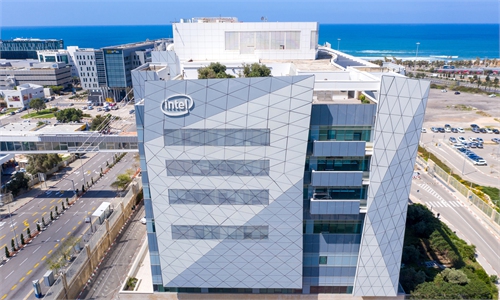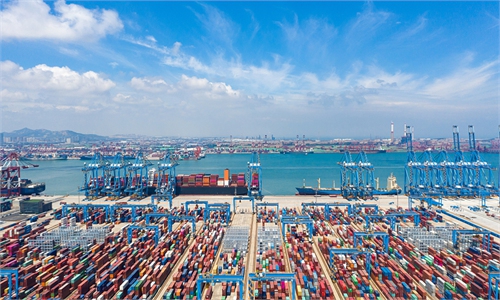COMMENTS / EXPERT ASSESSMENT
Biz Quick Take: Why the US’ chip crackdown on China is doomed to fail

Intel Photo: VCG
US President Joe Biden promised big when he took over the White House in January 2021, but a year into his presidency, his major legislative priorities, ranging from infrastructure to climate change to voting rights, have stalled in a deeply gridlocked US Congress. Under mounting pressure as his approval ratings plunge to record lows, Biden saw an opening and is seeking to cling onto it.
On Friday, US chip giant Intel announced a $20 billion investment in a new semiconductor plant in the US state of Ohio. Biden sought to seize on the opportunity to resurrect an important element of his legislative agenda - a $52 billion investment bill in the chip sector. Celebrating Intel's announcement at the White House, Biden said that "China is doing everything it can to take over the global market so they can try to outcompete the rest of us."
By now, no one should be surprised at US politicians' trick of playing up the imaginary "China threat" theory for their own political expediency. In this regard, Biden is just emulating his predecessor Donald Trump. However, as with any ill-advised policy, the US' attempt to shut down China's semiconductor industry and preserve its hegemony is not only doomed to fail but could also backfire.
The biggest flaw in the US' attempt is the failure to recognize the nature of the global semiconductor industry. US politicians' narrow-mindedness and zero-sum mentality obscures their vision to see that the chip supply chain is a highly globalized one with various countries performing different roles. As much as US political leaders try to hyping up the "China threat" theory in chips, the US is still leading in various aspects, including design.
However, it is also certain that the US will not dominate the entire global chip supply chain - from research to design to manufacturing to application - by itself. Any suggestion it could is simply delusional. But that's what the US is clearly trying to do, as it has moved to crack down on China's chip industry, imposing sanctions and restrictions on Chinese technology companies and other means. It wants China completely out of the global chip supply chain, but what it will see could be an even stronger Chinese chip industry.
China has been lagging behind other countries in various aspects of the chip industry. But it has been rising rapidly over the past several years. For example, the Chinese mainland accounted for only 3.8 percent of global chip sales in 2015, but it captured 9 percent of the global semiconductor market in 2020, closely following Japan and the EU, according to the Semiconductor Industry Association (SIA).
Behind that rise is an unprecedented annual growth rate of 30.6 percent registered by the Chinese semiconductor industry, said the SIA, which estimates that China could capture as much as 17.4 percent of global market share by 2024, if it maintains a 30 percent compound annual growth rate over the next three years.
Other areas that have seen rapid development in the Chinese semiconductor industry is the surging number of new companies, which reached 15,000 in 2020, focusing on a niche within the chip supply chain.
There are also at least two areas where the US cannot completely erase China's role: manufacturing and application market. China for the time being might not be able to produce the most advanced chips, but it has the most efficient and complete manufacturing supply chain that can produce many widely used chips; whereas US manufacturing sectors have been lagging for years. China also has the biggest market for application of chips, which could in turn support research and development for the long-run.
Obviously, China has made significant investments in many areas of the semiconductor industry over the years, so did many other major players, including South Korea, the EU and the US. That should be normal for countries to do so in such a competitive and lucrative industry. However, what makes the US' attempt so vicious is its attempt to crack down others. Such ill attempt will not hold back the development of China's semiconductor industry, and instead, could hurt the US' own industry.



